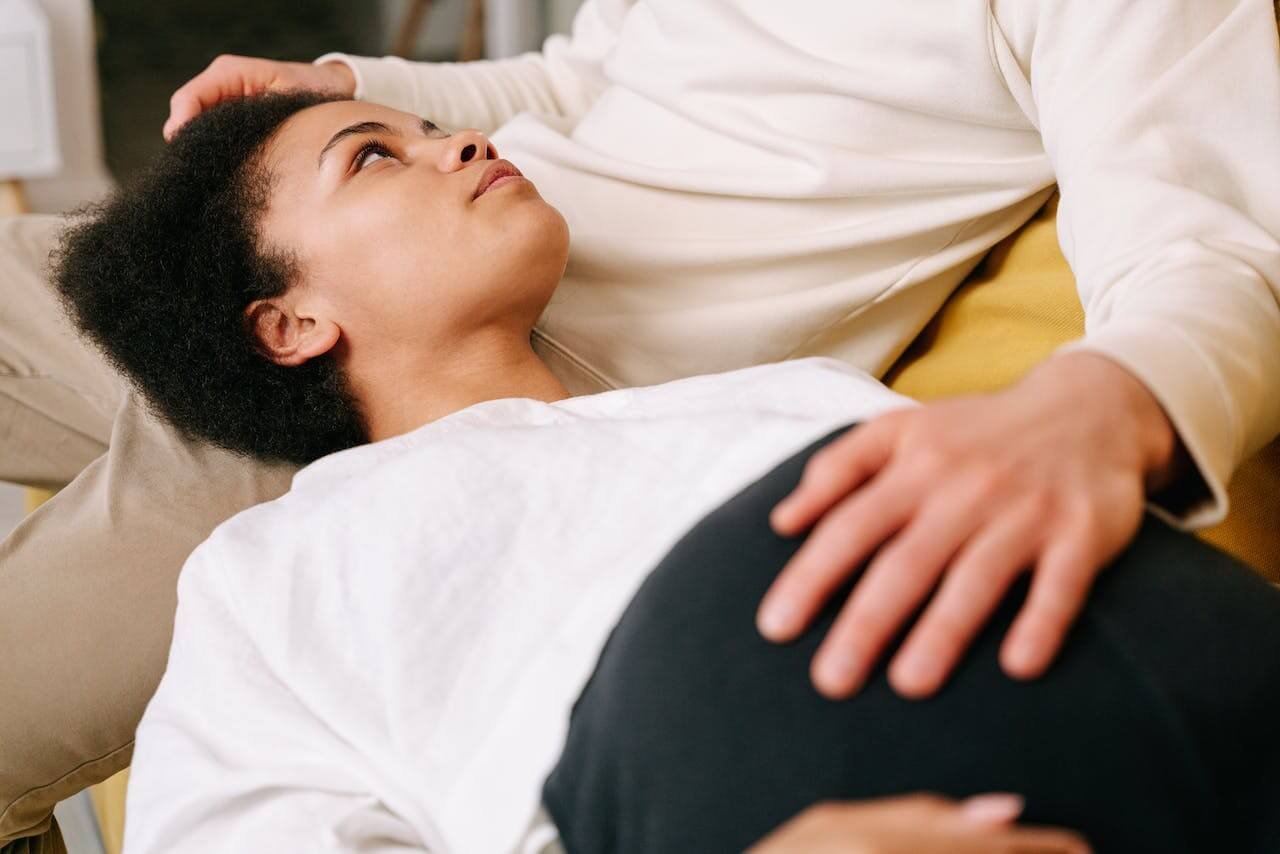The second trimester of pregnancy marks a turning point for both the expectant mother and the developing baby. As the initial discomforts of the first trimester begin to subside, a sense of anticipation and excitement takes hold. This period of rapid growth and development is also a time for expectant mothers to prioritize their health and well-being, ensuring the optimal development of their precious cargo.
Second Trimester at a Glance
Foetal Development
The second trimester witnesses a remarkable transformation in the developing foetus. In the second trimester, the foetus undergoes a period of accelerated growth, increasing in size from around 3 inches to approximately 14 inches or around 36 cms. During this time, the baby’s organs continue to mature and become more functional. At week 16, the heart begins to beat regularly, and by week 20, the baby can make sucking motions and swallow amniotic fluid. By the end of the second trimester, the baby is peeing into the amniotic fluid and most of the liquid around the baby is urine, which provides cushioning and helps keep the temperature snug and stable.
Foetal Responses
As the foetus develops, its ability to respond to stimuli increases. By week 16, the baby may startle in response to loud noises, and by week 20, there may be response to tactile stimulation on the mother’s abdomen. These responses are a testament to the foetus’s growing nervous system and sensory perception. By the end of the second trimester, a loud noise could make the baby jump and kick, which should not hurt but might take the mother by surprise. In some cases, the mother can even feel the occasional hiccup.
Nutritional Choices
The mother’s diet plays a critical role in the development of the fetus. A healthy diet rich in nutrients such as folic acid, iron, calcium, and vitamin D is essential for foetal growth and development. Additionally, avoiding harmful substances such as alcohol, tobacco, and caffeine is crucial for protecting the foetus from potential harm.
Embracing Exercise
Regular exercise during pregnancy offers numerous benefits for both the mother and the fetus. Exercise helps to maintain a healthy weight, improve mood, and reduce the risk of pregnancy-related complications. However, it is essential to consult with a healthcare provider before embarking on any new exercise regimen during pregnancy.

Bodily Changes
Nausea fades, energy surges, and that glorious baby bump starts popping like a superhero’s pecs. But let’s be real, amidst the sunshine, there are a few clouds brewing – anxieties, questions, and the occasional bodily blip that might leave you scratching your head (or nose, depending on the situation). Offer back rubs for the aches, celebrate the bump with cute outfits, and become the master of the pregnancy pillow fluffing. Remember, happy body, happy mama, happy you!
Foetal Development
As your partner enters the second trimester of her pregnancy, you’re about to witness an incredible transformation. Your baby, once a tiny speck, is now growing at an astonishing rate, developing complex organs and systems that will prepare them for life outside the womb. This exciting period is also a time for you, the dad to be, to actively engage in the pregnancy journey. Here’s a guide to help you understand the remarkable changes taking place and how you can support your partner and your growing baby during this pivotal phase.
Week 13 – 16
In the early weeks of the second trimester, your baby undergoes a significant growth spurt. At week 13, your little one is about 2.9 inches long, resembling the size of a peach. Scientifically, this stage is marked by the rapid development of crucial structures like the nervous system and limbs.
Developmental Milestones
- Formation of the vocal cords and teeth buds.
- Reflexive movements, including sucking and swallowing.
- Formation of fingerprints.
Week 17 – 20
As we approach the midpoint of the second trimester, your baby’s growth accelerates. By week 17, your baby is approximately 5.1 inches long – akin to the size of a turnip. Scientifically, this period witnesses the refinement of sensory organs, bone development, and the onset of coordinated movements.
Developmental Milestones
- Formation of the vernix caseosa (a protective layer on the skin).
- Initiation of meconium production in the intestines.
- Development of the lanugo (fine hair covering the baby’s body).
Week 21 – 24
Entering the latter half of the second trimester, your baby’s sensory world blossoms. At week 21, your baby measures about 10.5 inches – reminiscent of a banana. Scientifically, this period sees the maturation of the brain and sensory organs, enabling your baby to respond to external stimuli.
Developmental Milestones
- Maturation of taste buds and swallowing reflex.
- Rapid eye movement (REM) sleep cycles.
- Auditory system development, allowing responses to external sounds.
Week 25 – 28
In the final weeks of the second trimester, your baby experiences the finishing touches of organ development. At week 25, your baby measures around 13.6 inches – about the length of an eggplant. Scientifically, this period witnesses the strengthening of bones, further refinement of reflexes, and the preparation for the next stage of rapid growth.
Developmental Milestones
- Ossification of bones continues, especially in the limbs.
- Enhanced lung maturation, with the development of surfactant.
- Further refinement of sensory responses, including touch and pain perception.
Foetal Responses
As your partner’s pregnancy progresses, you might start to wonder how you can connect with your baby before he or she arrives. Well, one of the most amazing things about pregnancy is the ability to feel and respond to your baby’s movements and actions. This is a beautiful way to bond with your little one and witness their development firsthand.
Feeling Your Baby’s Movements
Starting around week 20, you may start to feel your baby’s movements. These movements can feel like flutters, kicks, or punches. They may be more noticeable at first when your partner is resting or lying down. As your baby grows, their movements will become stronger and more frequent.

Responding to Your Baby’s Movements
One of the most enjoyable things about feeling your baby’s movements is that you can actually respond to them. If your baby kicks, you can gently tap on your partner’s abdomen. If your baby seems to be startled by a loud noise, you can talk to them in a soothing voice. These interactions are a simple yet powerful way to bond with your baby and show them that you are already connecting with them.
Tips for Dads to Be: Engaging with Your Baby
Here are some tips for dads-to-be to engage with their growing babies:
- Talk to your baby: Your baby can hear your voice from inside the womb, so talk to them often. Tell them about your day, read to them, or sing them songs.
- Play music for your baby: Studies have shown that babies can respond to music in the womb. Play your favorite music or choose calming tunes to create a relaxing environment for your baby.
- Gently massage your partner’s abdomen: Massaging your partner’s abdomen can help to soothe your baby and encourage them to move.
- Attend prenatal appointments together: Attending prenatal appointments with your partner is a great way to learn more about your baby’s development and to ask questions about your baby’s movements.
- Read books about pregnancy and fetal development: There are many great books available that can help you to learn more about your baby’s development and to feel more connected to them.
Feeling and responding to your baby’s movements is a truly special experience. It is a way to connect with your baby before they are even born and to witness their remarkable development firsthand. As you engage in these interactions, you will start to build a bond with your baby that will last a lifetime.
Nutritional Choices
As your partner embarks on the incredible journey of pregnancy, her body becomes the nurturing ground for your growing baby. During pregnancy, your baby’s nutritional needs skyrocket as they undergo a period of rapid growth and development. From week 13 to week 24, your baby’s brain, bones, and organs are forming at an astonishing pace. To support this growth spurt, your partner’s body requires an increased intake of essential nutrients, including folic acid, iron, calcium, and vitamin D.
Folic Acid
Folate, also known as vitamin B9, is a critical nutrient for preventing neural tube defects in the developing baby. It plays a crucial role in the formation of the brain and spinal cord. Ensure your partner consumes folic acid-rich foods, such as leafy green vegetables, legumes, and fortified cereals.
Iron
Iron is another essential nutrient during pregnancy, as it helps to transport oxygen from the mother’s bloodstream to the developing baby. Iron deficiency can lead to anemia, which can cause fatigue and other complications. Encourage your partner to include iron-rich foods in her diet, such as lean meats, poultry, fish, beans, and iron-fortified cereals.
Calcium
Calcium is crucial for your baby’s skeletal development, ensuring they grow strong bones and teeth. Dairy products, such as milk, yogurt, and cheese, are excellent sources of calcium. Alternatively, include calcium-fortified plant-based milk alternatives and leafy green vegetables.
Vitamin D
Vitamin D plays a vital role in calcium absorption and bone development. While your body can produce vitamin D from sunlight exposure, it’s essential to ensure adequate intake through diet, especially during pregnancy. Encourage your partner to consume vitamin D-rich foods, such as fatty fish, eggs, and fortified milk or dairy alternatives.
Dad To be’s Role
As a father to be, you can play a significant role in supporting your partner’s nutritional choices. Here are some ways to contribute:
- Encourage a Balanced Diet: Help your partner plan meals that include a variety of nutrient-rich foods from all food groups.
- Cook Together: Make cooking a fun and shared experience. Involve your partner in meal preparation and try new recipes together.
- Support Healthy Habits: Encourage your partner to stay hydrated by drinking plenty of water and to engage in regular physical activity, as advised by her healthcare provider.
- Educate Yourself: Learn about the nutritional needs of pregnancy and share your knowledge with your partner.
- Be a Supportive Partner: Be understanding and supportive of your partner’s food choices and preferences during this time.
Embracing Exercise
As your partner embarks on the incredible journey of pregnancy, regular exercise becomes an essential component of her overall well-being. Physical activity during pregnancy offers a multitude of benefits for both the mother and her growing baby. It not only contributes to a healthy weight gain but also improves mood, reduces the risk of pregnancy-related complications, and prepares the mother’s body for childbirth. As a dad to be, you can play a crucial role in supporting your partner’s exercise routine and encouraging her to reap the many benefits it has to offer.

Understanding the Benefits of Exercise During Pregnancy
Regular exercise during pregnancy is associated with a plethora of health benefits. Let’s delve into some of the key advantages it presents:
- Improving Mood and Reducing Stress: Exercise is a natural mood booster, releasing endorphins that can alleviate stress, anxiety, and depression, commonly experienced during pregnancy. Engaging in physical activity can help your partner feel more energized, improve her sleep quality, and enhance her overall emotional well-being.
- Reducing the Risk of Pregnancy-Related Complications: Regular exercise during pregnancy can help to reduce the risk of developing gestational diabetes, preeclampsia, and high blood pressure. These complications can pose serious risks for both the mother and the baby.
- Preparing for Childbirth: Exercise can strengthen the muscles of the pelvic floor, back, and abdomen, which are crucial for labor and delivery. It can also improve cardiovascular fitness, helping your partner cope with the physical demands of childbirth.
Supporting Your Partner’s Exercise Journey
As a father-to-be, you can play a pivotal role in supporting your partner’s exercise journey. Here are some ways to encourage and assist her:
- Encourage and Accompany Her: Express your support for your partner’s desire to exercise and offer to accompany her on walks, jogs, or gym sessions. This can provide motivation, companionship, and a sense of shared responsibility.
- Find Suitable Activities: Together, explore various exercise options that align with your partner’s interests and fitness level. Low-impact activities like walking, swimming, prenatal yoga, and Pilates are excellent choices during pregnancy.
- Set Realistic Goals: Help your partner set realistic and achievable exercise goals. Start with short durations and gradually increase the intensity and duration as her fitness improves.
- Monitor Safety: Encourage your partner to listen to her body and take breaks when needed. Remind her to stay hydrated and wear comfortable clothing and supportive footwear.
- Consult a Healthcare Provider: Encourage your partner to consult with her healthcare provider before embarking on any new exercise regimen during pregnancy. They can provide personalized advice and guidance based on her individual health profile.
Remember, exercise is not a one-size-fits-all approach. Encourage your partner to find activities she enjoys and that fit her lifestyle and preferences. With your support and encouragement, she can reap the numerous benefits of exercise and set the stage for a healthy and fulfilling pregnancy.
Bodily Changes
The Snack Queen
Your partner, once content with a cheese stick or two, is now ravenous, capable of inhaling an entire pizza in record time. Embrace it, dads! This is your chance to channel your inner Masterchef and whip up some pregnancy-friendly feasts. Bonus points for mastering the art of the midnight food cravings.
Mood Swings
One minute she’s giggling over puppies , the next she’s weeping at an old post about humans of somewhere. Buckle up, emotional rollercoaster incoming! Be the anchor in her storm of hormones. Offer a hug, a shoulder to cry on, and maybe even a well-timed dad joke (though choose wisely, some puns can land with the grace of a dropped bowling ball).?
Sleep? What Sleep?
Forget your eight hours of uninterrupted slumber. Now, sleep comes in sporadic bursts, often accompanied by strange contortions and nocturnal bathroom explorations. Be the sleep ninja! Offer back rubs, brew calming teas, and be ready to have late night binges..
Body Blues
Your partner might develop stretch marks, spider veins, and acne that would make a teenager cringe. Resist the urge to comment (seriously, just don’t). Instead, shower her with compliments, tell her she’s glowing (even if it’s thanks to pregnancy hormones), and remind her that this beautiful bump is housing your mini-me – worth every freckle and line.
Conclusion: A Time of Joy and Anticipation
The second trimester of pregnancy is a time of joy, anticipation, and transformation. Remember, dads, being a second-trimester partner is about understanding, empathy, and a whole lot of laughs (because sometimes, you just have to laugh to avoid crying, right?). Listen to her concerns, validate her feelings, and most importantly, celebrate the miracles happening inside her. That tiny heart beating, those little kicks you feel – these are moments to cherish.
Bonus Dad Tips
- Master the art of the foot rub: Trust me, those swollen ankles will be eternally grateful.
- Become a pregnancy app aficionado: Track the baby’s development, learn fun facts, and be prepared to answer any random question that pops into her head. Check out our article on the tests and common concerns during the second trimester.
- Plan a romantic getaway / Babymoon! Even a cozy night in with candles and takeout can be the perfect escape from the second-trimester craziness.
- Don’t forget the self-care: You’re on this journey too, dads! Make time for your own hobbies, get enough sleep, and remember, a happy dad makes a happy pregnant partner.

Leave a Reply